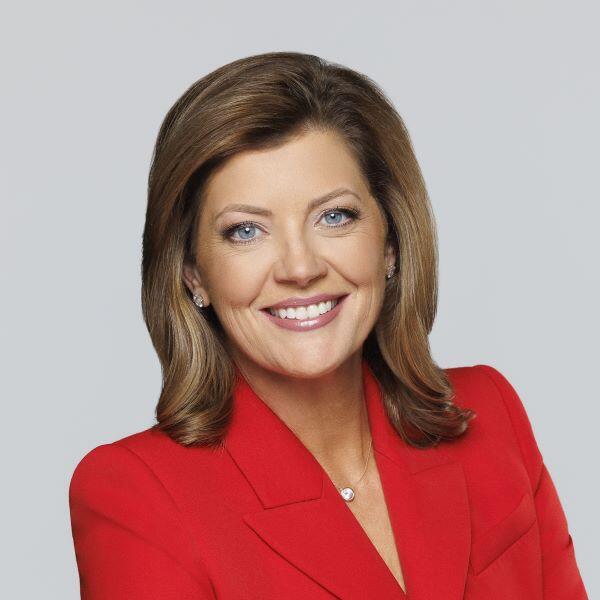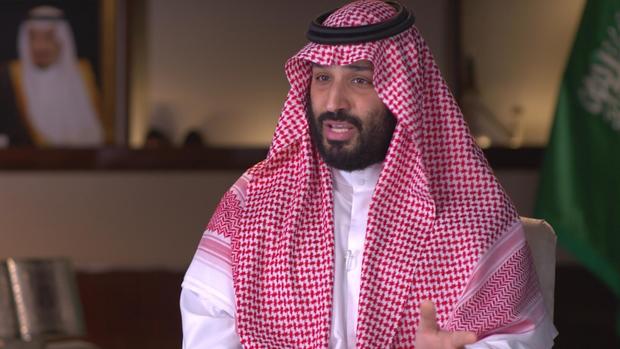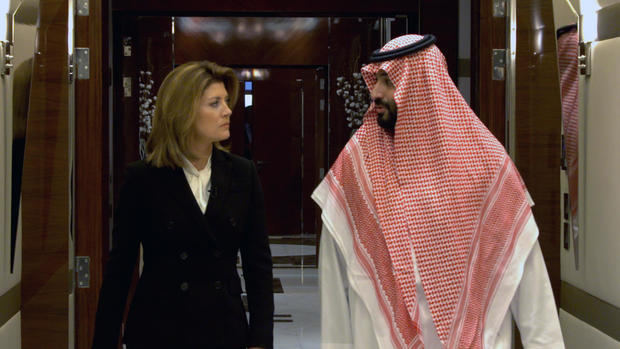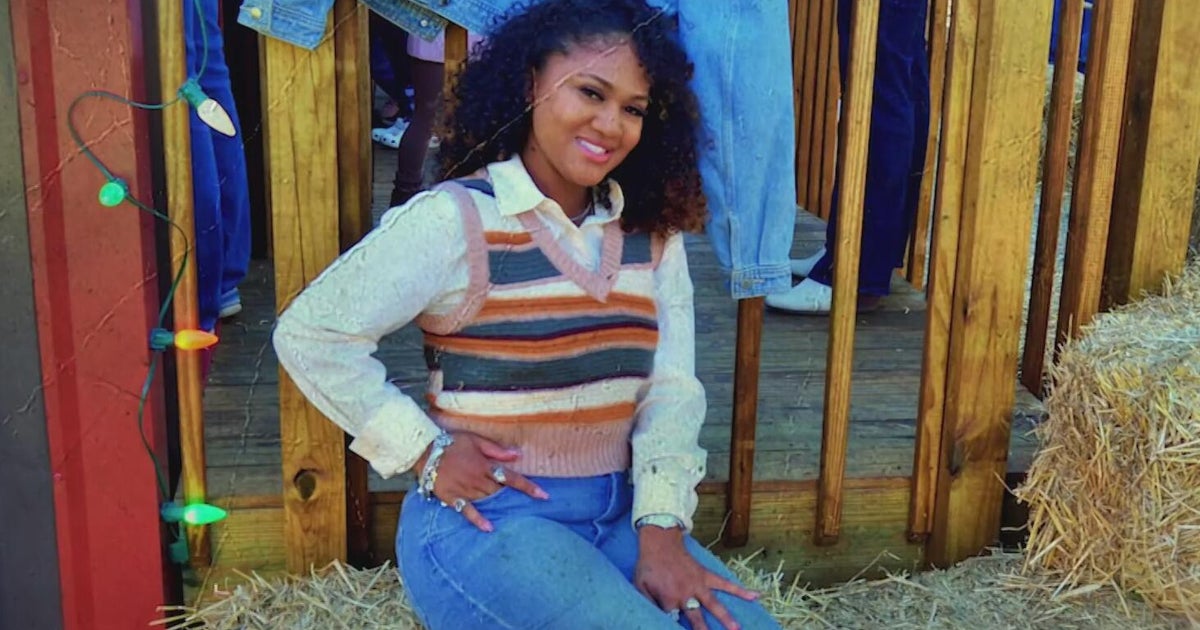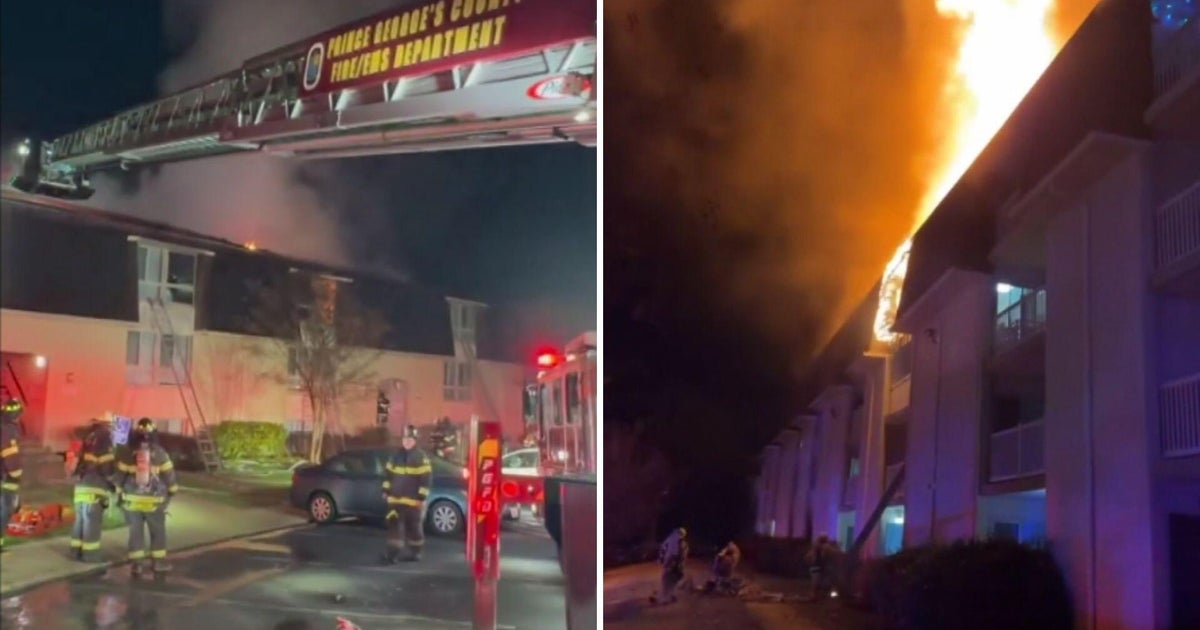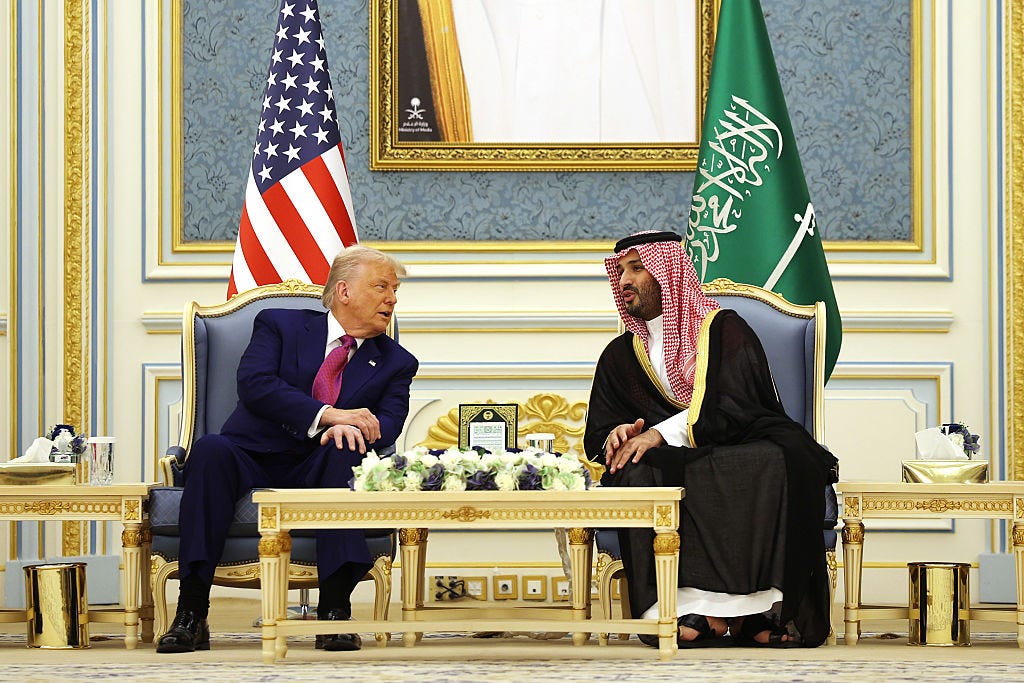Mohammad bin Salman denies ordering Khashoggi murder, but says he takes responsibility for it
Crown Prince Mohammad bin Salman rules Saudi Arabia day-to-day on behalf of his father, the king. The heir to the throne is a man of contradictions. He presents himself as a young, progressive leader, a supporter of women in the workplace and, famously, behind the wheel. But he is also conducting a bloody war in Yemen, stands accused of targeting civilians and children and employing famine as a weapon. He's rounded up political dissidents and the CIA believes he is behind the brutal murder of Washington Post columnist Jamal Khashoggi, a prominent critic of the crown prince.
Earlier this month, after an Iranian missile and drone attack on Saudi oil facilities, the United States committed additional American troops to help defend the Saudis. It was nearly midnight by the time we spoke with Crown Prince Mohammad bin Salman on Tuesday, at the royal court in Jeddah. There was a lot to ask. Our first question was about the death, a year ago, of Jamal Khashoggi, something the crown prince has never discussed in a television interview.
Norah O'Donnell: Did you order the murder of Jamal Khashoggi?
Crown Prince Mohammad bin Salman (Translation): Absolutely not. This was a heinous crime. But I take full responsibility as a leader in Saudi Arabia, especially since it was committed by individuals working for the Saudi government.
Norah O'Donnell: What does that mean that you take responsibility?
Crown Prince Mohammad bin Salman (Translation): When a crime is committed against a Saudi citizen by officials, working for the Saudi government, as a leader I must take responsibility. This was a mistake. And I must take all actions to avoid such a thing in the future.
On October 2, 2018, Jamal Khashoggi entered the Saudi consulate in Istanbul and never left. Turkish investigators allege a Saudi hit team was waiting for him. They report he was killed almost immediately and that his body was dismembered. To this day his remains have not been found. Saudi public prosecutors have charged 11 men, including the deputy intelligence chief Major General Ahmed Asiri. Saud al-Qahtani, once the prince's powerful right-hand man, has been implicated but not formally charged.
Norah O'Donnell: The world wants the answer to this question. How did you not know about this operation?
Crown Prince Mohammad bin Salman (Translation): Some think that I should know what three million people working for the Saudi government do daily? It's impossible that the three million would send their daily reports to the leader or the second highest person in the Saudi government.
Norah O'Donnell: Two of your closest advisors who are accused of orchestrating this plot were fired by the king, removed from your inner circle. The question is, how could you not know if this was carried out by people who are close to you?
Crown Prince Mohammad bin Salman (Translation): Today the investigations are being carried out. And once charges are proven against someone, regardless of their rank, it will be taken to court, no exception made.
Norah O'Donnell: I've read what the Saudi prosecutor has said about those that are charged in this murder. And it's gruesome, the details. When you heard that people close to you and in your government carried out such a grisly murder, and that the American government thinks that you ordered it, what did you think?
Crown Prince Mohammad bin Salman (Translation): I believe what you mentioned is not correct. There isn't an official statement announced by the American government in this regard. There isn't clear information or evidence that someone close to me did something to that effect. There are charges and they're being investigated. But again you cannot imagine the pain that we suffered, especially as the Saudi government, from a crime such as this one.
Norah O'Donnell: The CIA has concluded with medium to high confidence that you personally targeted Khashoggi and you probably ordered his death.
Crown Prince Mohammad bin Salman (Translation): I hope this information to be brought forward. If there is any such information that charges me, I hope it is brought forward publicly.
Norah O'Donnell: What kind of threat is a newspaper columnist to the Kingdom of Saudi Arabia that he would deserve to be brutally murdered?
Crown Prince Mohammad bin Salman (Translation): There is no threat from any journalist. The threat to Saudi Arabia is from such actions against a Saudi journalist. This heinous crime, that took place in a Saudi consulate.
Norah O'Donnell: I spoke with a prominent U.S. senator before I came here. And he said because of what happened with Jamal Khashoggi and what's happened in Yemen that in his words there's not a lot of good will around here in Congress for Saudi Arabia. How much has it hurt the relationship?
Crown Prince Mohammad bin Salman (Translation): The relationship is much larger than that and this is a heinous incident and painful to all of us. Our role is to work day and night to overcome this and to make sure our future is much better than anything that happened in the past.
On Saturday, September 14, just before 4 a.m., an onslaught of more than two dozen Iranian-made drones and low flying cruise missiles crippled the kingdom's oil production. These images, never before released, are from the Saudi state oil company, known as Aramco.
Norah O'Donnell: This attack hit the heart of Saudi Arabia's oil industry. Were you blindsided?
Crown Prince Mohammad bin Salman (Translation): I might disagree with you. This attack didn't hit the heart of the Saudi energy industry, but rather the heart of the global energy industry. It disrupted 5.5% of the world's energy needs, the needs of the U.S. and China and the whole world.
Norah O'Donnell: The kingdom is the world's number one importer of arms, of military equipment; billions of dollars spent on equipment. How could it not prevent an attack like this?
Crown Prince Mohammad bin Salman (Translation): Saudi Arabia is almost the size of a continent, it is bigger than all of Western Europe. We have 360 degrees of threats. It's challenging to cover all of this fully.
Saudia Arabia's air defenses include U.S. Patriot and Hawk missile systems which were not designed to shoot down drones.
Norah O'Donnell: What do you think was the strategic reason that Iran struck Aramco?
Crown Prince Mohammad bin Salman (Translation): I believe it's stupidity. There is no strategic goal. Only a fool would attack 5% of global supplies. The only strategic goal is to prove that they are stupid and that is what they did.
Norah O'Donnell: Secretary Mike Pompeo has called what Iran did in his words, "an act of war." Was it an act of war?
Crown Prince Mohammad bin Salman (Translation): Of course. Yes.
Norah O'Donnell: What kind of effect would a war between Saudi Arabia and Iran have on the region?
Crown Prince Mohammad bin Salman (Translation): The region represents about 30% of the world's energy supplies, about 20% of global trade passages, about 4% of the world GDP. Imagine all of these three things stop. This means a total collapse of the global economy, and not just Saudi Arabia or the Middle East countries.
Iran appears willing to risk war to improve its position. After the Trump administration pulled out of the Iran nuclear deal, the U.S. imposed tough economic sanctions. Iran's president, Hassan Rouhani, will not negotiate until the sanctions are lifted. It is a standoff. The crown prince told us all options should remain on the table.
Crown Prince Mohammad bin Salman (Translation): If the world does not take a strong and firm action to deter Iran, we will see further escalations that will threaten world interests. Oil supplies will be disrupted and oil prices will jump to unimaginably high numbers that we haven't seen in our lifetimes.
Norah O'Donnell: Does it have to be a military response?
Crown Prince Mohammad bin Salman (Translation): I hope not.
Norah O'Donnell: Why not?
Crown Prince Mohammad bin Salman (Translation): Because the political and peaceful solution is much better than the military one.
Norah O'Donnell: Do you think that President Trump should sit down with President Rouhani and craft a new deal?
Crown Prince Mohammad bin Salman (Translation): Absolutely. This is what President Trump is asking for, this is what we all ask for. However, it is the Iranians who don't want to sit at the table.
Since 2015, the United States has provided limited support to Saudi Arabia in their war against an Iranian-backed militia, to their south, in Yemen. The United Nations estimates that the conflict has left more than 19,000 civilians dead or injured. 10 million people are starving.
Norah O'Donnell: It is called the worst humanitarian crisis in the world. What's the solution?
Crown Prince Mohammad bin Salman (Translation): First, if Iran stops its support of the Houthi militia, the political solution will be much easier. Today we open all initiatives for a political solution in Yemen. We hope this happens today rather than tomorrow.
Norah O'Donnell: You're saying tonight that you want to negotiate an end to the war in Yemen?
Crown Prince Mohammad bin Salman (Translation): We are doing this every day. But we try to turn this discussion into an actual implementation on the ground, and the Houthis a few days ago announced a ceasefire, from their side, we consider it a positive step to push for more serious and active political dialogue.
Norah O'Donnell: Why, after five years, are you optimistic tonight that a ceasefire could hold, that could lead to an end to the war in Yemen?
Crown Prince Mohammad bin Salman (Translation): As a leader, I must always be optimistic every day. If I'm a pessimist, I should leave my post and work somewhere else.
In Saudi Arabia, social change is happening slowly. More than two years after the crown prince came to power, most women still cover their faces. And we struggled to find any who would speak with us on camera.
Women recently won the right to drive by royal decree. Guardianship laws that prevent women from travelling without a man's permission have also been relaxed.
But some of the women who fought for these rights have lost their own freedom in the process.
Norah O'Donnell: There are about a dozen female activists that have been detained for more than a year. Why were they put in jail?
Crown Prince Mohammad bin Salman (Translation): Saudi Arabia is a country governed by laws. Some of these laws I might disagree with personally, but as long as they are now existing laws, they must be respected, until they are reformed.
One of the most prominent female activists who fought for the right to drive is Loujain al-Hathloul. She has been held in a Saudi prison for over a year.
Norah O'Donnell: Is it time to let her go?
Crown Prince Mohammad bin Salman (Translation): This decision is not up to me. It's up to the public prosecutor, and it's an independent public prosecutor.
Norah O'Donnell: Her family says that she has been tortured in prison. Is that right?
Crown Prince Mohammad bin Salman (Translation): If this is correct, it is very heinous. Islam forbids torture. The Saudi laws forbid torture. Human conscience forbids torture. And I will personally follow up on this matter.
Norah O'Donnell: You will personally follow up on it?
Crown Prince Mohammad bin Salman (Translation): Without a doubt.
Norah O'Donnell: Publicly you have pledged to change Saudi Arabia, to transform the economy, to talk about a moderate Islam, to allow women to have more rights. Yet there is a crackdown and a jailing of women who raise issues about things that need to change in Saudi Arabia. That is the perception, that you do not support women's rights and human rights and that these are concrete examples of women who have been jailed.
Crown Prince Mohammad bin Salman (Translation): This perception pains me. It pains me when some people look at the picture from a very narrow angle. I hope that everybody comes to the Kingdom of Saudi Arabia and sees the reality, and meets women and Saudi citizens, and judges for themselves.
Norah O'Donnell: What lessons have you learned? And have you made mistakes?
Crown Prince Mohammad bin Salman (Translation): Even prophets made mistakes. So how come we, as humans, expect not to make mistakes? The important thing is that we learn from these mistakes and not repeat them.
Produced by Keith Sharman. Associate producer, Alex J. Diamond
